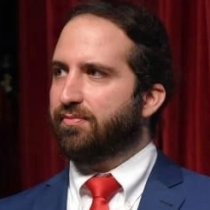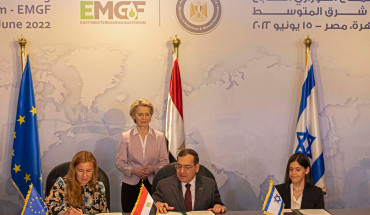Contents:
- Efforts toward a deal on Gaza provide daily twists in the plot, while the price of failure continues to rise
- The central irony at the heart of Biden’s Middle East diplomacy on the Gaza war
- Turkey halts trade with Israel as Erdoğan seeks to shore up his base
- Iraq leads the way in resolving thorny, long-running detainee crisis in Syria
- EU aid to Lebanon: Short-term relief, long-term concerns
- Why Pakistan is once again a US priority
Efforts toward a deal on Gaza provide daily twists in the plot, while the price of failure continues to rise
Nimrod Goren
Senior Fellow for Israeli Affairs

-
A limited deal to pause the fighting in Gaza and release Israeli hostages had been under negotiation for more than three months but, to date, failed to culminate in a deal, with mediators putting the blame on both Israel and Hamas.
-
Recent hopes for progress have been repeatedly shattered as the gap between Israeli and Hamas leaders remains wide; but Hamas’ surprise Monday announcement it had accepted an Egyptian-Qatari plan, combined with Israeli preparations for an attack in Rafah, raise the urgency for some kind of diplomatic success.
Back in late January 2024, the media first reported on a possible six-week deal under consideration to pause the fighting in Gaza and release Israeli hostages. The United States, Egypt, and Qatar then stepped up their mediation efforts in February in the hopes of reaching such an outcome ahead of Ramadan (which started in early March). “[M]y hope is that by next Monday we’ll have a ceasefire,” President Joe Biden said on Feb. 27, reflecting the intense US diplomatic investment in this endeavor. Alas, Ramadan came and went, negotiations continued, but no deal was reached.
In March, Washington raised the pressure on Israeli Prime Minister Benjamin Netanyahu by not vetoing a United National Security Council resolution on a cease-fire; and in April, messaging from the Biden administration signaled that Israel was ready for a deal but Hamas needed to be pushed further. As talks lingered, doubts and concerns intensified about the fate of the hostages, an Israeli military operation in Rafah, the effectiveness of the international mediators, and the readiness of Israel and Hamas to reach a deal.
A blame game was at play. Little reliable information on the talks was shared with the public, leading to weeks and months of speculation, spin, and leaks serving different purposes — e.g., to impact the negotiations process, save lives, or advance domestic political interests. The zone of possible agreement between Israel and Hamas was seemingly centered around an initial humanitarian phase, including a roughly 40-day truce, the return of more than 30 Israeli hostages (about 25% of those still held by Hamas), and the release of several hundred Palestinian prisoners.
On what would happen next — especially regarding an end to the war— the gaps were too wide and could only be bridged through constructive ambiguity, third-party guarantees, and mutual tolerance for face-saving statements that would enable both sides to portray the deal as a win. Strong political will would have been essential for this to happen; however, more recent developments indicated that Israeli Prime Minister Netanyahu as well as Hamas leader Yahya Sinwar have other preferences.
Netanyahu appears willing to offer humanitarian-related concessions that he previously rejected; but notably, he has yet to rule out a Rafah operation or commit to ending the war. He is not only concerned about Israel’s national security but also — and many in Israel believe, primarily — with the fate of his coalition and his political survival. In turn, Sinwar, who was reportedly willing before to delink a humanitarian phase from his demand to end the war, took a tougher stance as Israel faces a growing domestic crisis and increased international criticism. Nevertheless, on May 6, Hamas surprisingly announced its acceptance of an Egyptian-Qatari plan. Israel immediately declared it would assess this but initially stated that the cited plan is different from the one coordinated a few days earlier between the Arab mediators, the US and Israel.
The Israeli public yearns to see the hostages come home. A recent poll showed a large majority in favor of the above-mentioned humanitarian pause; a plurality expressed support for the option of a broader deal that includes the return of all Israeli hostages, an end to the war, and the release of thousands of Palestinian prisoners. According to the poll, only 29% of the Israeli public thinks Netanyahu is doing enough to seal a deal. The prime minister’s latest hardline rhetoric reinforced this perception.
While Arab media indicated that Hamas might respond favorably to the most recent mediators’ offer, on May 5 Netanyahu announced his determination to continue the war, undermining the prospects for diplomatic headway. Hamas later launched a deadly rocket attack from Rafah into Israel, which further derailed any possible progress. The most recent twist in the plot — the yet-to-be-evaluated Hamas acceptance of a cease-fire proposal — generates hopes among hostage families that their loved ones may soon return home. They quicky went out into to the streets to put pressure on the Israeli government to accept a deal. Alas, Israeli officials voiced early skepticism on whether an actual breakthrough is about to happen.
Endlessly drawn-out negotiations can incentivize escalatory actions. This is already happening as Israel inches closer to launching a military campaign against Rafah and Hamas threatens to walk away from the talks. These may still simply be negotiation tactics, but they are risky, belying the growing urgency to reach a deal both sides could agree upon.
Follow: @GorenNimrod
The central irony at the heart of Biden’s Middle East diplomacy on the Gaza war
Brian Katulis
Senior Fellow for US Foreign Policy

-
CIA Director Bill Burns is trying to salvage ongoing negotiations on a cease-fire and hostage release as Israel prepares for a military operation in Rafah, an operation that the Biden administration has raised concerns about.
-
American diplomacy has ironically empowered some of the fiercest opponents of a two-state solution to the Israeli-Palestinian conflict that multiple US administrations have called for.
Central Intelligence Agency (CIA) Director Bill Burns spent this past weekend in intensive 11th-hour talks aimed at salvaging indirect negotiations between Israel and Hamas brokered by Qatar and Egypt to achieve a temporary cease-fire and hostage release. Burns is traveling to Egypt, Qatar, and Israel just as Israeli Prime Minister Benjamin Netanyahu vows to press on with Israel’s military campaign in Gaza. In recent weeks, the Biden administration has repeatedly warned Israel’s government against undertaking a military offensive in Rafah, the southern part of the Gaza Strip where most Palestinians have fled since the start of the war, because the operation would likely exacerbate the humanitarian disaster.
This quiet diplomacy by Burns comes after US Secretary of State Antony Blinken spent much of the past week in the region but had little to show from his seventh Middle East trip since the war began. Blinken aimed to put the spotlight on efforts to increase humanitarian aid for Palestinians in Gaza, with the United States successfully encouraging Israel to open more border crossings to allow in more food and emergency supplies, just as the Pentagon continues to build a temporary port for aid delivery. Kerem Shalom, one of the border crossings opened for this purpose, was closed once again after a Hamas attack killed four Israeli soldiers on Sunday in its vicinity.
The Biden administration has operated for the past several months with a game plan that could be simplified into three main steps:
- Secure a temporary cease-fire and hostage release in the Gaza war.
- Use the lull in fighting to flood the zone with aid and build a wider diplomatic framework for governance and post-conflict reconstruction, including support from Arab nations for a pathway to a Palestinian state.
- Produce progress on the wider regional integration efforts, including the Israeli-Saudi normalization deal that was a feature of the Biden administration’s regional approach before Oct. 7, 2023.
The key problem with this three-part strategy is that it is dependent on achieving a temporary cease-fire, which had eluded negotiators in the on-again, off-again talks for about five months now. Late on Monday, there were signs of a potential breakthrough as news reports emerged that Hamas had accepted the latest deal. But even if a cease-fire is achieved, a number of political forces among Palestinians and Israelis — as well as regional actors like Iran and its Axis of Resistance partners — actively oppose progress on the Israeli-Palestinian front, not to mention broader regional normalization and integration efforts.
This situation points to the central irony in the Biden administration’s diplomatic efforts on ending the Israel-Hamas war: the tactics it uses have actually ended up empowering opponents of the two-state solution that it seeks to achieve in the long run and which multiple US administrations have endorsed in the past.
Israel’s current government continues to refuse to define an endgame in Gaza and has rejected a two-state solution. Hamas, the terrorist group that started this latest war and that both Israel and the United States have said they want to eliminate as a security threat, is in a perverse way the lynchpin to any temporary cease-fire — not the Palestinian Authority or the Palestine Liberation Organization. Moreover, the US lacks a coherent strategic approach to Iran — another force that opposes a two-state solution to the Israeli-Palestinian conflict — and this presents an additional potential challenge in trying to insulate conflict resolution efforts between the Israelis and Palestinians.
This irony or contradiction is in part due to the differing clocks between managing short-term crises and driving policy toward achieving long-term goals. At the same time, the Biden administration has insufficiently examined ways to empower and work more closely with those elements among Israelis, Palestinians, and other countries in the region that share its long-term goals.
All this highlights the importance of President Joe Biden’s meeting at the White House today with King Abdullah II of Jordan, a long-standing US partner that has formally been at peace with Israel for nearly 30 years. In seeking a pathway out of its current reactive crisis diplomacy, the United States should look to double down on its cooperation with regional partners, actively bolster those who share America’s ultimate goal of a two-state solution, and use its leverage to marginalize any actors who oppose it.
Follow: @Katulis
Turkey halts trade with Israel as Erdoğan seeks to shore up his base
Gönül Tol
Director of Turkey Program and Senior Fellow, Black Sea Program

-
The ruling Justice and Development Party suffered its worst ever electoral defeat in the March 31 local elections and was hit hard by its Islamist ally-turned-rival, the New Welfare Party, over the inconsistencies between its words and its actions on the Gaza war.
-
To stop the bleeding among his most conservative and pro-Palestinian base, Erdoğan has taken several recent steps, including, first and foremost, halting all direct trade with Israel.
On May 3, Turkey announced that it would halt all trade with Israel until it allows humanitarian aid to flow into Gaza uninterrupted and a permanent cease-fire is in place. The move comes after President Recep Tayyip Erdoğan’s ruling Justice and Development Party (AKP) suffered its worst electoral defeat in its more than two decades in power in the March 31 municipal elections. After the elections, Erdoğan suggested that the party’s failure to explain where it stood on the Gaza war was partly to blame for the AKP’s defeat.
Indeed, the AKP’s Islamist ally-turned-rival, the New Welfare Party (YRP), capitalized on Erdoğan’s inconsistent stance following Hamas’ Oct. 7 attack. Although the president harshly criticized Israel for the mounting death toll in Gaza and defended Hamas as a “liberation group,” companies closely linked to his family continued to trade with Israel. The YRP, which had backed Erdoğan in last year’s presidential elections, criticized the government’s position in the run-up to the March municipal elections, capturing more than 6% of the vote and contributing to the victory of the main opposition Republican People’s Party.
To stop the bleeding among his most conservative and pro-Palestinian base, Erdoğan has taken several steps since the local elections. Key among them is the decision to halt all direct trade with Israel. In recent years, Israel has relied heavily on Turkish products. Bilateral trade between the two countries stood at around $7 billion in 2023, with three-quarters of it Turkish exports. Despite the trade ban, however, Azerbaijani oil is still being sent to Israel via the Turkish Mediterranean port of Ceyhan.
Turkey’s trade ban will strain ties between the two countries, only recently mended as part of Erdoğan’s efforts to turn over a new page in his relations with the region. Erdoğan hopes to capitalize on the anti-Israeli mood in the Middle East over the Gaza war to boost his popularity both at home and in the region. Dialing up criticism of Israel might help his popularity on the Arab street, but he needs to do a lot more at home to halt his party’s downward trajectory.
Follow: @gonultol
Iraq leads the way in resolving thorny, long-running detainee crisis in Syria
Charles Lister
Senior Fellow, Director of Syria and Countering Terrorism & Extremism programs

-
The crisis involving tens of thousands of ISIS detainees and their families held in camps in northeastern Syria has presented the international community with an unprecedented legal, logistical, humanitarian, and diplomatic challenge.
-
Despite progress in 2022 and 2023, the pace and breadth of detainee repatriations to third countries beyond Syria or Iraq slowed markedly in 2024; and several Middle Eastern governments’ decisions to normalize ties with the Assad regime complicate the situation further by preventing their diplomatic engagement with the SDF, which controls the camps.
On April 28, Iraqi authorities successfully repatriated 714 citizens from the al-Hol camp in northeastern Syria to the al-Jeddah Community Rehabilitation Center near Mosul. The 191 families — mostly women and children — had been held in al-Hol since early 2019, when the territorial defeat of ISIS saw tens of thousands surrender and be transferred to a camp for displaced people outside the town of al-Hol. That sudden and unexpected surge saw the al-Hol camp’s population swell from roughly 10,000 to more than 70,000 in a matter of weeks. Over half were children under 12 years old.
This detainee crisis has presented the international community with an unprecedented legal, logistical, humanitarian, and diplomatic challenge. While a majority of those in al-Hol and a smaller camp, known as al-Roj, were Iraqis and Syrians, a sizeable minority originated from more than 60 countries around the world. To make the situation more complex, a further 10,000 male ISIS militants were also captured and placed in a network of more than 25 separate, makeshift prison facilities. For ISIS, this mass detention has been a consistently central and potent theme of its propaganda. Multiple prison breaks have occurred since 2019, and ISIS militants continue to infiltrate al-Hol, seeking to control the camp and recruit young boys into its ranks.
If this situation existed under the authority of a nation-state, it would be hard enough to resolve; but this unprecedented crisis exists in a third of Syrian territory held by the Syrian Democratic Forces (SDF) and their civilian governing body, known as the Autonomous Administration. All diplomacy around repatriation thus has to go through (non-state) SDF entities.
Since early 2019, the population of al-Hol has fallen by nearly 40% to approximately 43,000 — thanks in large part to Iraq’s concerted program of managed returns. On March 9 of this year, an additional 622 Iraqis were repatriated, in a process that has sustained a steady stream of repatriations every 6-8 weeks since early 2023. Of the remaining al-Hol residents, 45% are Iraqi, 40% Syrian, and 15% originate from at least 45 third countries. A further 2,600 people reside in the al-Roj camp, 80% of whom are third-country nationals.
While Iraq remains an example for all when it comes to repatriation, concerted diplomatic efforts by the United States achieved some meaningful progress on third-country nationals since 2022, when more than 600 people were repatriated to 15 countries (Sweden, Russia, the Netherlands, Maldives, Germany, the United Kingdom, Azerbaijan, Albania, Kosovo, Belgium, Austria, Tajikistan, France, Canada, and Australia). In 2023, at least 628 more were repatriated to nine countries (France, Spain, Kyrgyzstan, Tajikistan, Azerbaijan, Denmark, Canada, Russia, and the UK); so far in 2024, 177 have returned to four countries (Maldives, Kyrgyzstan, Azerbaijan, and Tajikistan).
Despite the spike in 2022 and 2023, the pace and breadth of repatriations has clearly slowed markedly in 2024. Significant progress is required, particularly when it comes to repatriations to Middle Eastern countries, but the wave of regional governments normalizing ties with Bashar al-Assad’s regime in 2023 created a major new stumbling block to regional returns — as diplomatic engagement with the SDF is no longer possible. The persistence of the detainee crisis in Syria presents a formidable long-term security threat, and the international community’s failure to more comprehensively resolve it is good news for one actor alone: ISIS.
Follow: @Charles_Lister
EU aid to Lebanon: Short-term relief, long-term concerns
Fadi Nicholas Nassar
U.S.-Lebanon Fellow

-
The European Union’s €1 billion aid package, intended to help Lebanon address the challenges posed by hosting Syrian refugees, suggests Brussels continues to lack a coherent and sustainable foreign policy for the Levant, opting instead for short-term measures that undermine security and governance.
-
While the European initiative aims to improve relations between host and local communities as well as bolster state capacity to curb irregular migration and provide services, it may only incentivize the Lebanese political class to hold out on reforms and manipulate migration to influence EU and international donor policy.
During her visit to Beirut last week, European Commission President Ursula von der Leyen announced a €1 billion aid package for Lebanon. The package comprises grants scheduled for distribution by 2027 and is aimed at bolstering essential services like education, social protection, and health care, as well as driving economic reforms. Notably, nearly three-quarters of the funds will be specifically allocated to assist Lebanon in addressing the challenges posed by hosting Syrian refugees.
This latest aid package follows earlier concerns raised by Cyprus about an influx of illegal migration from Lebanon as well as a string of contentious EU aid initiatives aimed at supporting efforts by fragile countries on the southern rim of the Mediterranean to curb irregular migration into Europe.
The EU plan has sparked controversy in crisis-hit Lebanon. While the refugee question has long been a divisive issue, social tensions have sharply increased since the country’s economic meltdown in late 2019, which thrust the vast majority of its population and refugee communities into multidimensional poverty.
Worsening matters, caretaker Prime Minister Najib Mikati has insisted that this aid is “unconditional” — despite the absence of any credible reforms that international donors have long suggested are key to unlocking international support for Lebanon.
Controversy and public declarations aside, this move suggests that the EU still lacks a coherent and sustainable foreign policy for the Levant, opting instead for short-term measures that undermine security and governance in critical zones that will continue to instrumentalize migration flows as pressure points on Brussels.
The refugee question in Lebanon has no easy answers. On the one hand, the Lebanese state has manifestly failed to protect Syrian refugees and provide them with their basic rights and needs. On the other hand, Syrian refugees fleeing the violence in Syria cannot, in complete violation of international law, be forced to return, risking death, torture, or violence and other gross violations of human rights already documented by the United Nations.
More than 9 out of 10 Syrian refugees in Lebanon live in extreme poverty and require humanitarian assistance to meet their basic needs. Recent months have also seen a sharp increase in anti-refugee violence, including by state authorities. Refugees are not only being scapegoated for Lebanon’s economic collapse but also, as in the case of the assassination of a local Lebanese official, Pascal Suleiman, for the country’s worsening political crisis.
While the EU aid package may strengthen the state’s ability to regulate the border and curb illegal migration, the issue is not primarily a result of inadequate capacity. Nor will the Lebanese state’s credibility problem be resolved by increased aid.
In the absence of a credible political process in Syria or a resolution of the core drivers of Lebanon's crisis, this tenuous dynamic will persist, leaving Syrian refugees deprived of their basic rights and social tensions at a breaking point. The vast majority of Syrian refugees in Lebanon remain unable to return home safely or relocate to third-country host states that could safeguard their rights. If the EU is seriously committed to burden-sharing that centers the rights of Syrian refugees, it must increase its own intake of refugees and work with the US to encourage more robust economies in the Middle East to allow refugee resettlement.
The European initiative aims to improve relations between host and local communities as well as bolster state capacity to curb irregular migration and provide services. However, it may only incentivize the Lebanese political class to hold out on anti-corruption and other governance reforms and manipulate migration controls and flows at strategic points in time to influence EU and international donor policy. Under such an outcome, refugees and local host communities will pay the price.
Follow: @dr_nickfn
Why Pakistan is once again a US priority
Syed Mohammad Ali
Non-Resident Scholar

-
Since assuming office in early March, Prime Minister Shehbaz Sharif has made two official trips to Saudi Arabia and hosted both Iranian President Ebrahim Raisi and acting US Undersecretary of State for Political Affairs John Bass.
-
Decision-makers in both Islamabad and Washington seem to have overcome mutual acrimony following the United States’ withdrawal from Afghanistan; while Pakistan remains insecure about America’s growing geostrategic partnership with India, it also wants to continue engaging with the US and avoid overreliance on China.
Pakistan’s new government is engaging in a flurry of diplomatic activity, undeterred by allegations of undue manipulation of the February 2024 elections by the powerful military establishment. Since assuming office in early March, Prime Minister Shehbaz Sharif has made two official trips to Saudi Arabia and hosted some important foreign dignitaries. Three months after exchanging tit-for-tat missile strikes with Iran, Iranian President Ebrahim Raisi came to Pakistan on April 21 for a three-day visit. Both sides vowed to increase bilateral trade from $2 billion to $10 billion a year over the next five years and complete the Iran-Pakistan gas pipeline project.
It is within this broader context that this past week’s arrival in Pakistan of John Bass, the acting US undersecretary of state for political affairs, should be considered. The Pakistani establishment has distanced itself from the accusations, leveled by the incarcerated former Prime Minster Imran Khan, of American tampering in Pakistani politics. However, Pakistanis in the diaspora have since lobbied the US Congress to convene an unprecedented hearing on the February elections, ironically inviting US censure of the Pakistani establishment. Despite expressing some rhetorical concern about the need to respect the democratic process, no actions of note have been taken. Current decision-makers in both Pakistan and the United States seem to have overcome mutual acrimony following the American withdrawal from Afghanistan and the sudden Taliban resurgence. While Pakistan remains insecure about America’s geostrategic partnership with what it considers to be an increasingly intolerant and aggressive India, Islamabad also wants to continue engaging with Washington and avoid placing all its eggs in the Chinese basket.
The United States and Pakistan have more security-related convergences in Afghanistan now, and the US is also backing Pakistan to secure long-term financial support from the International Monetary Fund. Pakistan would like to circumvent US sanctions against Iran, which are being further tightened due to the recent Iran-Israel escalation. If Pakistan reneges on the already delayed gas pipeline with Iran, it could potentially face as much as $18 billion in fines, which the country’s fragile economy cannot afford. Rather than being offered limited American support to pursue alternative energy sources, Pakistan may prefer to see similar leniency as was afforded to India, which was granted several waivers in the past for its investments in the Iranian deep-sea port at Chabahar, and which continues to import Russian armaments and oil. While India now has a huge economy and is also a willing partner with the US to contend with Chinese influence in South Asia, American engagements with Pakistan offer other advantages. Despite its current friction with the Taliban, Pakistan has the potential to enable flexibility within the Taliban regime and facilitate measures designed to bring relief for Afghan citizens. The current attempts by State Department officials to enhance collaboration with Pakistan in varied sectors are another way of offsetting increasing Chinese influence on this second-largest Muslim country with nuclear capabilities, even if it continues to struggle with a plethora of serious challenges.
Photo by AFP via Getty Images
The Middle East Institute (MEI) is an independent, non-partisan, non-for-profit, educational organization. It does not engage in advocacy and its scholars’ opinions are their own. MEI welcomes financial donations, but retains sole editorial control over its work and its publications reflect only the authors’ views. For a listing of MEI donors, please click here.













